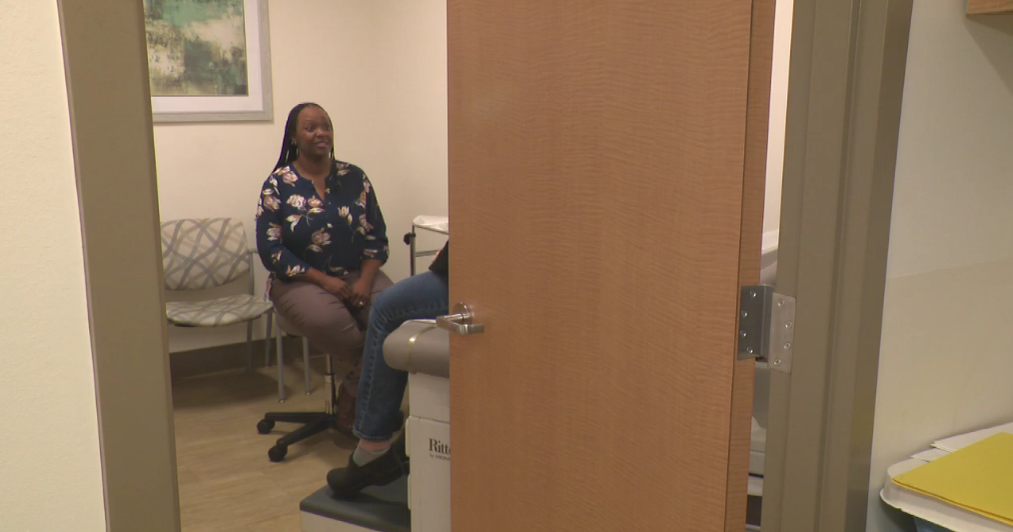Stress During Pregnancy May Harm Unborn Baby's Brain, Studies Find
(CNN) -- The stress a woman feels during pregnancy can affect the developing brain of her unborn child as documented on fetal brain scans, according to a new study published Monday in the medical journal JAMA Open Network.
Fetuses of expectant moms with higher anxiety levels were more likely to have weaker connections between two brain areas involved in executive and higher cognitive functions and stronger connections between parts of the brain connected to emotional and behavioral controls.
The study echoes other recent research that has found a direct impact of maternal stress on a baby's future development.
"Toxic levels of anxiety ... appear to be having direct effects on the way the fetal brain is being sculpted and organized in utero," said study author Catherine Limperopoulos, who directs the Developing Brain Institute at Children's National in Washington, DC.
"What the expectant mother is experiencing, the unborn baby is experiencing as well," Limperopoulos said.
A "toxic" level of anxiety in the study was defined as stress at levels that would interfere with a woman's ability to successfully go about her day-to-day roles and responsibilities, but not enough to be clinically diagnosed as a mental health illness or disorder.
Stress causes the pituitary and adrenal glands to flood the body with "fight-or-flight" hormones originally meant to help us escape from wild animals and other dangers. Today, we live with chronic stress, and those chemicals, which include the stress hormone cortisol, have the ability to cross the placental barrier between mom and baby.
The link between stress and fetal brain development is especially disturbing for women who are pregnant during the pandemic, Limperopoulos said, as her prior research has found stress for pregnant women in the era of Covid-19 has doubled or even tripled.
"And there's other published studies confirming that pregnant women are reporting very high levels of stress during the pandemic," she said.
"There's a critical take-home message here," Limperopoulos added. "It is really important that we are alerting women to the fact that high levels of stress may have an effect on their baby's development and direct them to resources that can help them better manage their stress during this pandemic and beyond."
The impact of maternal stress
Prior research has linked stress, anxiety and depression in pregnant mothers to social, emotional and behavioral problems in their offspring at later ages.
Clinical studies have found neurobehavioral deficits, such as impaired motor coordination, higher emotional reactivity and language delays in children born to stressed mothers.
Limperopoulos published a study earlier this year that found high levels of stress during pregnancy impaired a baby's brain biochemistry and the growth of the hippocampus -- the area of the brain involved in the formation of new memories, which is also associated with learning and emotions.
Prior studies have also found unusual electroencephalographic patterns in the frontal lobes of children, along with changes in the white matter responsible for organizing communication between the various parts of the brain.
Stress has also been linked to preterm birth. Women who felt overwhelmed and unable to cope during the months and even years before conception had shorter pregnancies than other women, according to a study published in July.
"Every day in the womb is important to fetal growth and development," said senior author Christine Dunkel Schetter, a distinguished professor of psychology and psychiatry who has researched the topic for years at the Stress Processes and Pregnancy Lab at the University of California, Los Angeles.
"Premature infants have higher risk of adverse outcomes at birth and later in life than babies born later, including developmental disabilities and physical health problems," Dunkel Schetter said.
Another study published this month found that maternal stress -- even before conception -- can shorten the length of a baby's telomeres, the compound DNA structures located at the tips of our chromosomes. responsible for protecting our cells from aging as they multiply.
Think of telomeres as the protective plastic caps on the ends of your shoelaces. Shortened telomeres have been linked to a higher risk of heart disease, cancers and earlier death.
"What our research tells us is that we may have early environmental and maternal factors influencing where a person starts in life, which may set them on course to age faster," said lead author Judith Carroll, an associate professor of psychiatry and biobehavioral sciences at the Semel Institute for Neuroscience and Human Behavior at UCLA, in a statement.
Stress among low-risk pregnancies
The latest study in JAMA Open Network analyzed the stress levels of 50 women whose pregnancies were between 24 and 39 weeks and considered low risk due to the expectant mothers' higher sociodemographic category. These well-educated, professional women were already healthy "control" volunteers in a larger study on fetal brain development. None of the women were on medication.
On the same day the women filled out widely used and validated stress, anxiety and depression questionnaires, researchers took highly sensitive brain scans of their developing babies.
"These are considered safe studies -- they do not harm the expectant mom or the fetus," Limperopoulos said. "Hopefully we might be able to then use this kind of technology as an early preventative technique in a pregnancy. That's what we're hoping for."
The study is following the mothers and babies until the children are 18 months of age, Limperopoulos said, to see if the effects during pregnancy are modified by environmental factors. And she is enrolling women in a future study to investigate if behavioral interventions can reduce an expectant mom's symptoms.
"And importantly, are we able to measure preventable effects or restorative effects for the fetus before birth," she said.
What's important to take away from the study is that the risk factors of stress, anxiety and depression are modifiable, Limperopoulos emphasized, yet "75% of women who are experiencing mental health problems during pregnancy go undetected because we're not systematically screenings for these problems."
"We really need to be paying attention to mental health problems during pregnancy, because they're not only affecting the pregnant women but they seem to have enduring effects on the baby in the months and probably years down the line," Limperopoulos added.
"If we as a society can make changes to help give pregnant women the resources they need and provide them with a safe and supportive environment before and during pregnancy, we may have a significant impact on the health of their children," Carroll said.
The-CNN-Wire
™ & © 2020 Cable News Network, Inc., a WarnerMedia Company. All rights reserved.







